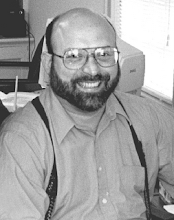This year at Armadillo Con 31, I had the honor of meeting and chatting with
James Frenkel, a senior editor with TOR Books. I did the usual polite introduction of myself, business card in hand, and told him that I hope to have a manuscript pass into his hands someday. He inquired about said manuscript and what my writing credentials were. I gave him a brief (10 second) description of the novel currently sitting on an agent's desk and the one short story I had published at the time.
He looked at me and asked if I was still writing short stories. I said of course. He encouraged me to writing short stories. I thanked him for his advice and let other slavering individuals garner his attention.
His comment stuck in my mind. The week after the Con, I went back and reviewed all of the short stories I had written since I started. I read them in the order in which I wrote them. I noticed that there was a remarkable difference in the style and quality of writing between the oldest and the newest stories. THAT made me think. I started my novel at the same time I started my first short story. Like any newbie writer, I was sure that the novel was a good one, albeit targeted to a specific sub-genre (hard science space opera). I thought I might have trouble selling it, but all of the people who read it (twenty or so) really enjoyed it. When I met the agent, there was interest and I was asked to send the usual package. It's been out with the agent for over three months; not a lot of time in the publishing industry.
But after reading my sequence of stories and the progression of my writing skills, I realized that Mr. Frenkel's advice wasn't just good, it was critical. No matter how good my novel was, if I started it today, it would be a much better novel. I had fallen for one of the worst pitfalls any new writer can succumb to: Thinking I was good at writing. Now, don't get me wrong, I like my stories and my characters, but will everybody else?
What helped me most of all was getting involved in critique groups. In an earlier post, I said not to write in a vacuum. Let people who write also read your stories and tell you where things could be better. My two favorite critique groups are
Critters.Org and the
Slug Tribe. They are open, honest, fair and have a code that explains how to critique and not be nasty about it. One memeber of the Slug Tribe,
Patrice Sarath, was teaching a Writer's Workshop at the Armadillo Con. During a critique of a story I submitted, she gave me one piece of valuable advise that FINALLY got through my neutronium skull. My writing was good and my story was interesting, but my POV was all over the place and that ruined it for her.
When I started writing after the Con and Workshop, I focused on nothing but keeping the POV where it should be. (I tend to write like I think, and I am so all over the place!) The difference between these stories and my earlier ones was readily apparent. I was getting even better!!!
But I still have a long way to go. Jim Fenkel's advice is what drives my writing now. Short stories are the pop quizzes of writing; you can get an immediate idea of where your skill set is while preparing to write your thesis.
So, thanks to Jim Frenkel and Patrice Sarath. You have been a great help to me!
